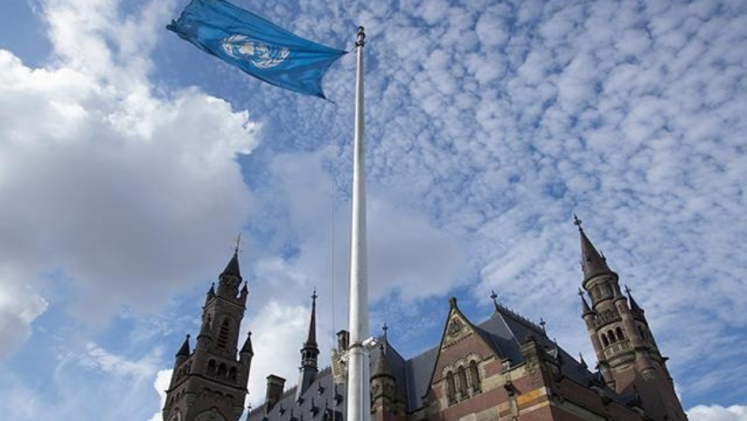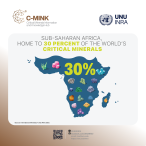After a year-long campaign by the Pacific island state Vanuatu, the UN General Assembly unanimously made a historic decision by requesting the International Court of Justice (ICJ) to issue an Advisory Opinion on the legal obligations regarding climate change on 29 March 2023. It is the first case of climate litigation that reached the ICJ. Soenke Kreft and Leonie Durschang quickly reflected on the outcome, why it matters and what might follow.
What is the role of the International Court of Justice and what is an Advisory Opinion?
The International Court of Justice (ICJ) is the principal judicial organ of the United Nations. It can act in two types of cases. Firstly, it can make judgments regarding legal disputes between Member States. Like in national courts, these judgements are binding. Secondly, the Court gives Advisory Opinions in legal questions when requested. While these Advisory Opinions are not binding, they have great authority and carry legal weight regarding what international law requires states to do. They clarify international law and are part of its development. They might also provide a reference for domestic courts when it comes to relevant legal questions.
Why an Advisory Opinion on climate change?
The UN’s Intergovernmental Panel on Climate Change has underlined the urgency and enormity of the climate change crisis. Climate impacts are often risk multipliers for existing vulnerabilities, causing additional distress to livelihoods and contributing to climate change induced migration and dislocation. Progress under the United Nations Framework Convention on Climate Change (UNFCCC) has been limited when compared to the emission reductions that are required. Vanuatu, leading a “core group” of countries, has therefore started a campaign to request the ICJ for an Advisory Opinion on climate change. On 29 March the UN General Assembly passed the draft resolution by consensus and kicked off the process.
What is the exact question the resolution asks the ICJ to explore and what follows next?
The resolution asks the ICJ for a specification of the obligations of countries under international law to protect the climate system for present and future generations. Further, it asks for the legal consequences when states breach these obligations and cause harm to other countries - here especially island countries - and vulnerable people. Following the resolution, the ICJ will seek for two rounds of written contributions by states as well as certain intergovernmental organizations, a process likely to take nine months. Following that, the Court will hold hearings with UN member states and afterwards issue its opinion. In an optimistic scenario the Advisory Opinion will be ready in time for COP29 that is scheduled to take place in November 2024.
How might the Advisory Opinion influence the international climate talks including the ongoing discussions on funding loss and damages?
While the Advisory Opinion is not directly binding, new legal clarity could bring momentum into the climate negotiations. 2023 to 2025 are envisaged to be super years for the climate process. COP28, taking place at the end of 2023, is foreseen to result in a funding arrangement and a fund to address loss and damage – the negative impacts of climate change that occur despite or in the absence of mitigation and adaptation. COP29 in 2024 will likely see some further operationalization of this fund, and it is also destined to set the new climate finance goal. Lastly, COP30 in 2025 will see the next round of climate action pledges by countries covering the period 2030-2035. The Advisory Opinion could encourage countries to make more ambitious pledges, and it could give tailwinds to interpretations of treaty obligations, such as those in line with obligations under the Paris Agreement. Additionally, it could provide arguments for countries to pledge resources for climate funds, including the upcoming funding arrangements on loss and damage. However, it needs to be said that requesting an Advisory Opinion is not without risks. An Advisory Opinion might be counterproductive and weaken the interpretation of obligations states have to help protect each other in the fight against human-induced climate change. One example of a disappointing Advisory Opinion takes us back to the 1990s when the ICJ was unable to conclude that the threat or use of nuclear weapons is prohibited in all circumstances. This in return contributed to more aggressive military doctrines of some countries with nuclear armaments.
What does the Advisory Opinion mean for national level climate debates and action?
Climate change is a reality for societies and communities. It is mainly the responsibility of national policymakers to take action against climate change, as it is their duty to enact laws protecting the livelihoods of people. As they are perceived to act insufficiently on climate change, the issue is increasingly pushed to the judicial system. National courts face a trend of climate cases. In general, such climate matters that come before a court of law (called climate litigation) can be directed towards governments or towards the private sector. Lawsuits are mainly demanding the mitigation of the emission of greenhouse gases and adaptation measures. Advisory Opinion of the ICJ has a moral value that national courts can take into account in their decisions, which is especially relevant in lawsuits against governments. Though the Advisory Opinion is not binding, it could nevertheless influence the interpretation of norms and legal principles by national courts. This in turn might lead to more ambitious climate action at the national level.





